ACFS Logistics: NSW Network Analysis, Challenges, and Solutions
VerifiedAdded on 2023/06/04
|11
|3623
|336
Report
AI Summary
This report provides an in-depth analysis of the logistics and supply chain management system of ACFS, a major container logistics operator in Australia, with a specific focus on its operations in New South Wales (NSW). The report identifies key challenges faced by ACFS, including difficulties in data management, environmental factors (particularly adverse weather conditions), labor shortages, customer management complexities, increasing fuel prices and taxes, and delays/cancellations. It then proposes various solutions, such as leveraging technology for data handling and route planning, predicting weather conditions, and exploring alternative strategies to mitigate the impact of government policies. The report highlights the importance of skilled labor and the need for government support to improve the overall efficiency and profitability of the logistics sector. The study emphasizes the need for strategic planning, expert involvement, and technological advancements to overcome the operational hurdles and ensure sustainable growth for ACFS.
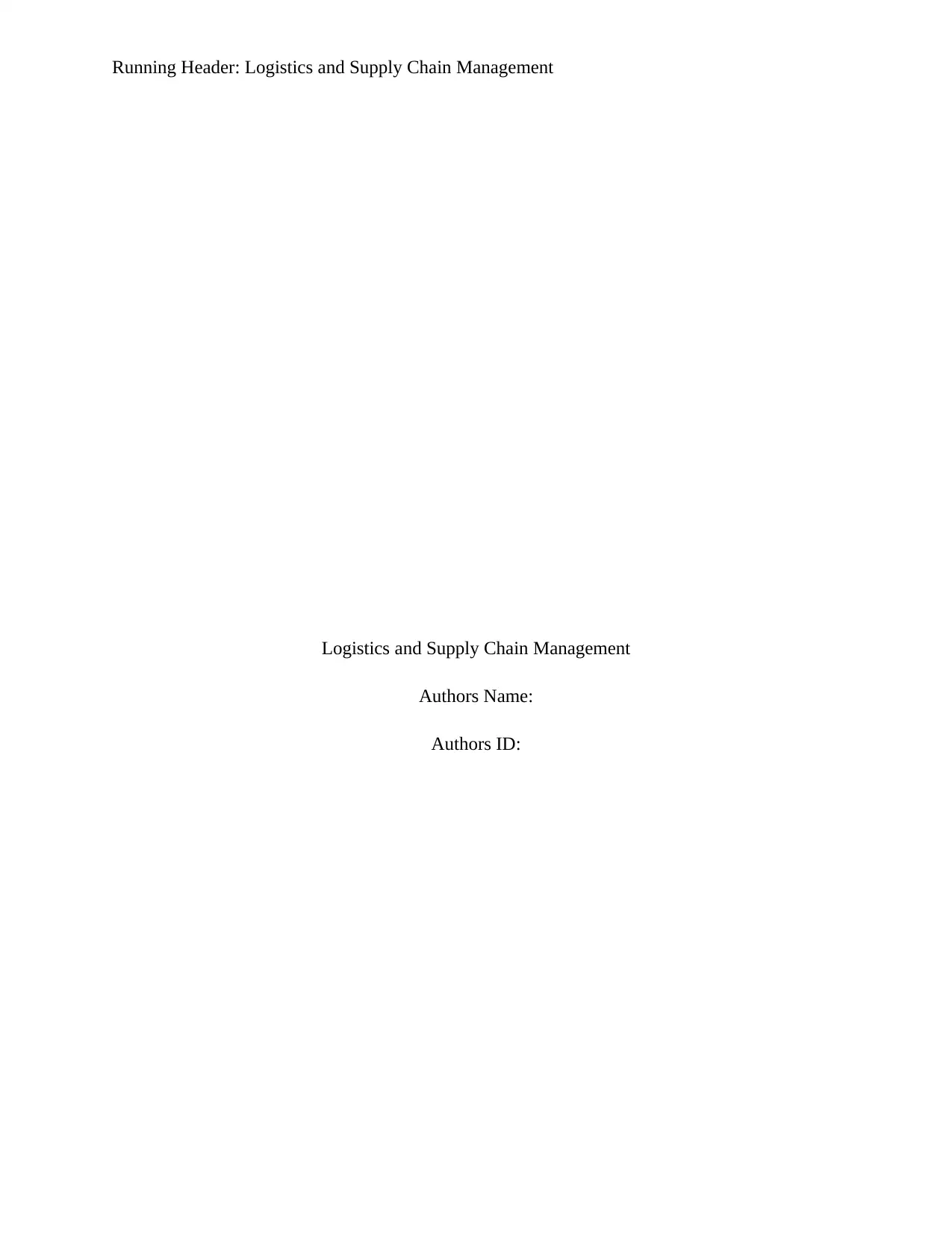
Running Header: Logistics and Supply Chain Management
Logistics and Supply Chain Management
Authors Name:
Authors ID:
Logistics and Supply Chain Management
Authors Name:
Authors ID:
Paraphrase This Document
Need a fresh take? Get an instant paraphrase of this document with our AI Paraphraser
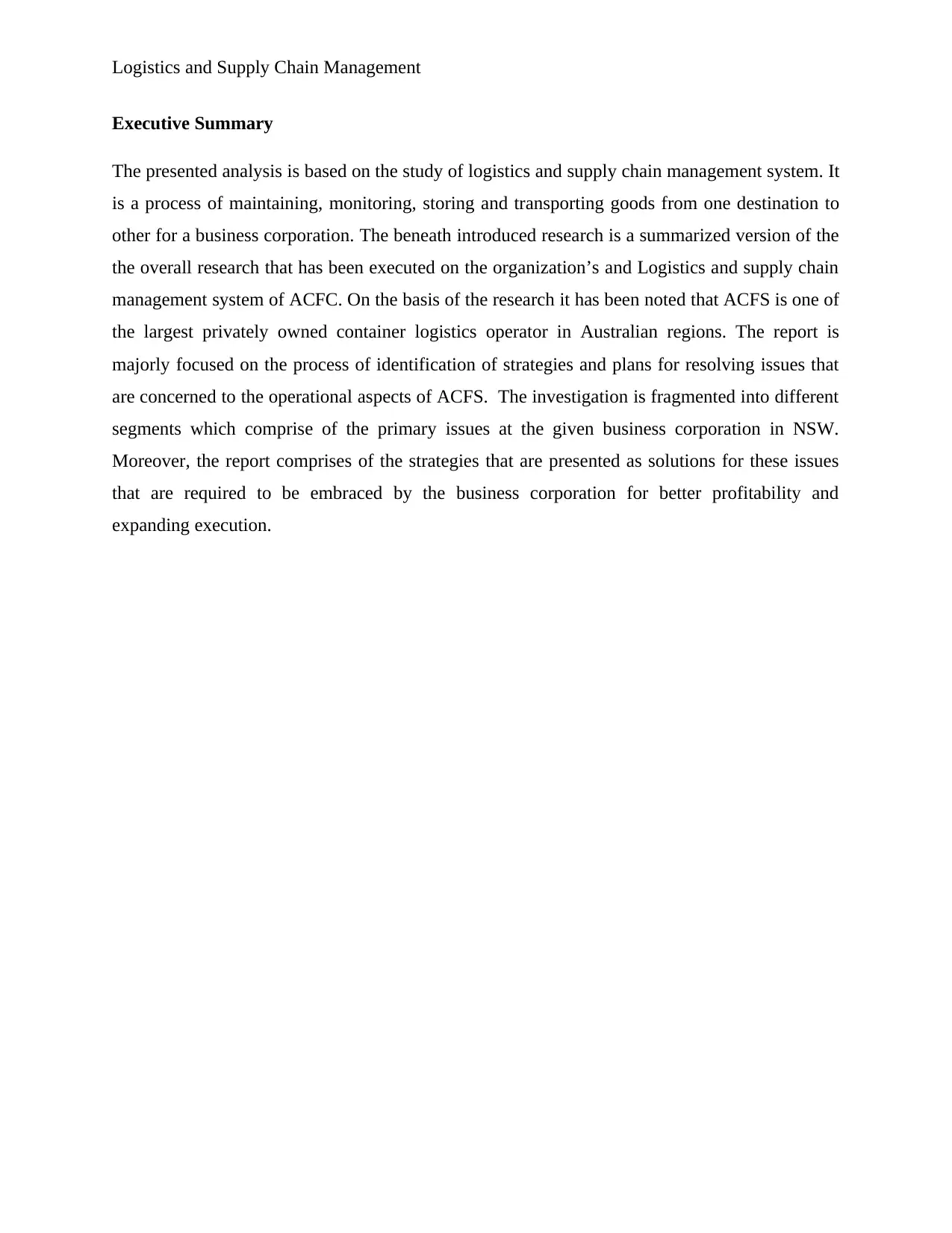
Logistics and Supply Chain Management
Executive Summary
The presented analysis is based on the study of logistics and supply chain management system. It
is a process of maintaining, monitoring, storing and transporting goods from one destination to
other for a business corporation. The beneath introduced research is a summarized version of the
the overall research that has been executed on the organization’s and Logistics and supply chain
management system of ACFC. On the basis of the research it has been noted that ACFS is one of
the largest privately owned container logistics operator in Australian regions. The report is
majorly focused on the process of identification of strategies and plans for resolving issues that
are concerned to the operational aspects of ACFS. The investigation is fragmented into different
segments which comprise of the primary issues at the given business corporation in NSW.
Moreover, the report comprises of the strategies that are presented as solutions for these issues
that are required to be embraced by the business corporation for better profitability and
expanding execution.
Executive Summary
The presented analysis is based on the study of logistics and supply chain management system. It
is a process of maintaining, monitoring, storing and transporting goods from one destination to
other for a business corporation. The beneath introduced research is a summarized version of the
the overall research that has been executed on the organization’s and Logistics and supply chain
management system of ACFC. On the basis of the research it has been noted that ACFS is one of
the largest privately owned container logistics operator in Australian regions. The report is
majorly focused on the process of identification of strategies and plans for resolving issues that
are concerned to the operational aspects of ACFS. The investigation is fragmented into different
segments which comprise of the primary issues at the given business corporation in NSW.
Moreover, the report comprises of the strategies that are presented as solutions for these issues
that are required to be embraced by the business corporation for better profitability and
expanding execution.
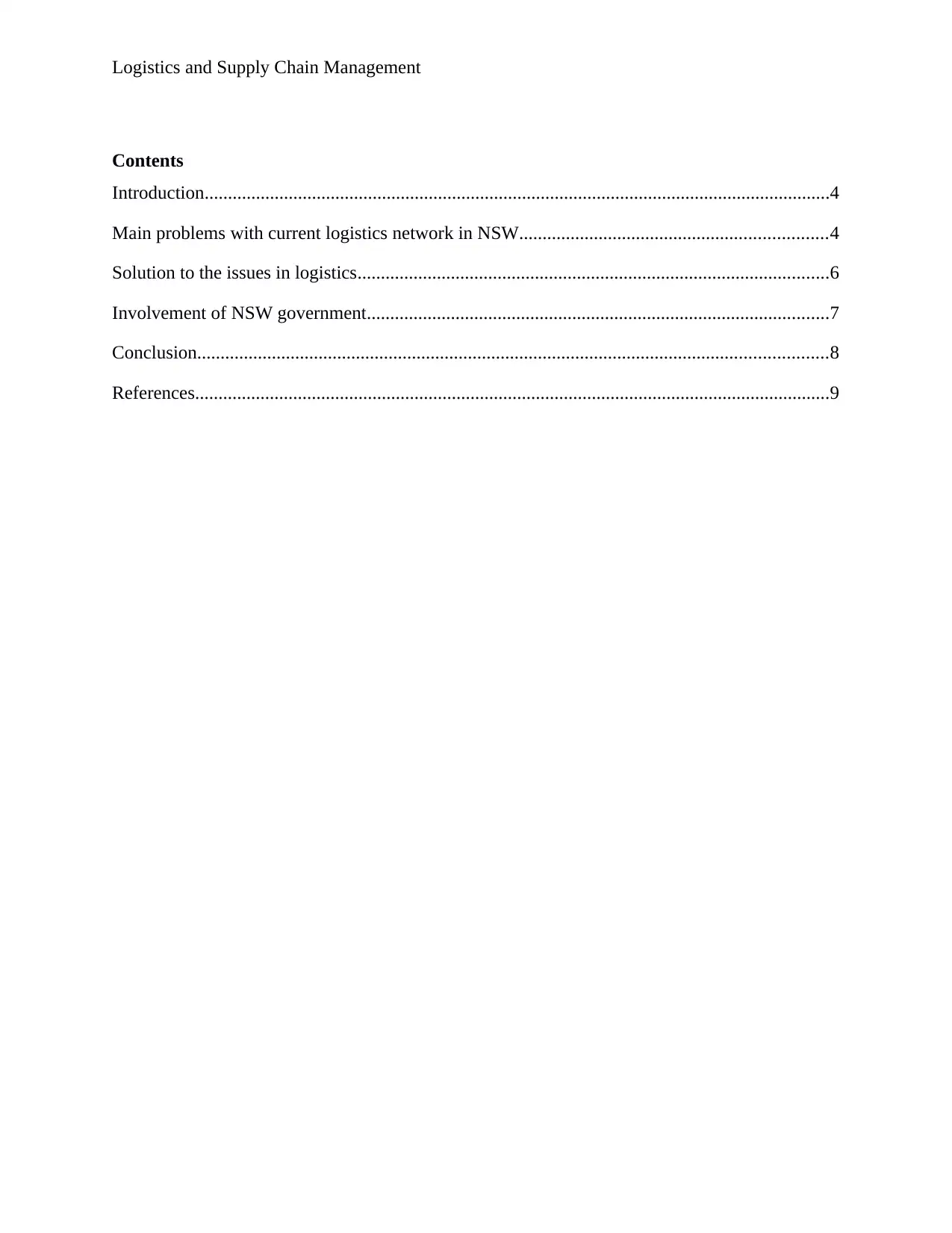
Logistics and Supply Chain Management
Contents
Introduction......................................................................................................................................4
Main problems with current logistics network in NSW..................................................................4
Solution to the issues in logistics.....................................................................................................6
Involvement of NSW government...................................................................................................7
Conclusion.......................................................................................................................................8
References........................................................................................................................................9
Contents
Introduction......................................................................................................................................4
Main problems with current logistics network in NSW..................................................................4
Solution to the issues in logistics.....................................................................................................6
Involvement of NSW government...................................................................................................7
Conclusion.......................................................................................................................................8
References........................................................................................................................................9
⊘ This is a preview!⊘
Do you want full access?
Subscribe today to unlock all pages.

Trusted by 1+ million students worldwide
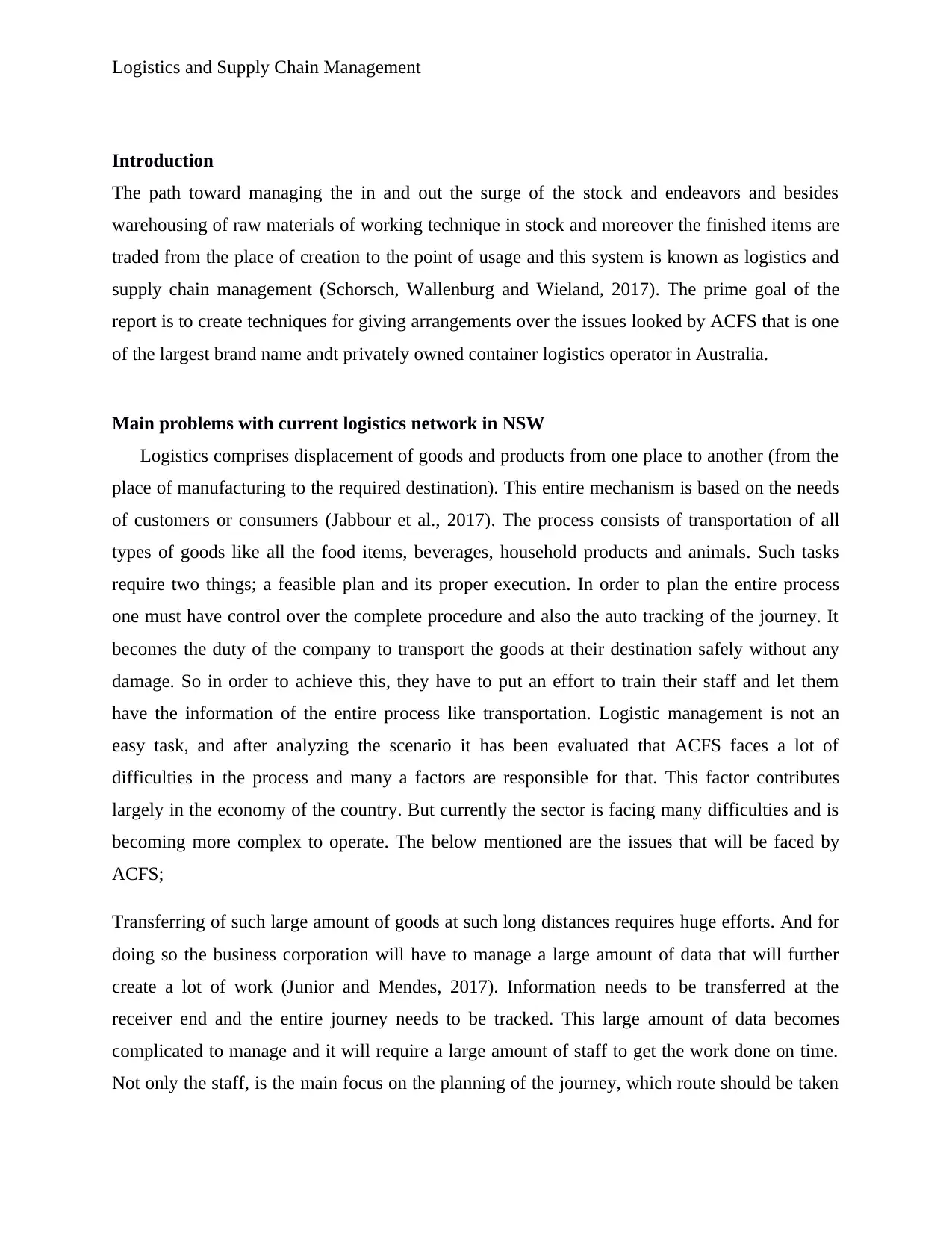
Logistics and Supply Chain Management
Introduction
The path toward managing the in and out the surge of the stock and endeavors and besides
warehousing of raw materials of working technique in stock and moreover the finished items are
traded from the place of creation to the point of usage and this system is known as logistics and
supply chain management (Schorsch, Wallenburg and Wieland, 2017). The prime goal of the
report is to create techniques for giving arrangements over the issues looked by ACFS that is one
of the largest brand name andt privately owned container logistics operator in Australia.
Main problems with current logistics network in NSW
Logistics comprises displacement of goods and products from one place to another (from the
place of manufacturing to the required destination). This entire mechanism is based on the needs
of customers or consumers (Jabbour et al., 2017). The process consists of transportation of all
types of goods like all the food items, beverages, household products and animals. Such tasks
require two things; a feasible plan and its proper execution. In order to plan the entire process
one must have control over the complete procedure and also the auto tracking of the journey. It
becomes the duty of the company to transport the goods at their destination safely without any
damage. So in order to achieve this, they have to put an effort to train their staff and let them
have the information of the entire process like transportation. Logistic management is not an
easy task, and after analyzing the scenario it has been evaluated that ACFS faces a lot of
difficulties in the process and many a factors are responsible for that. This factor contributes
largely in the economy of the country. But currently the sector is facing many difficulties and is
becoming more complex to operate. The below mentioned are the issues that will be faced by
ACFS;
Transferring of such large amount of goods at such long distances requires huge efforts. And for
doing so the business corporation will have to manage a large amount of data that will further
create a lot of work (Junior and Mendes, 2017). Information needs to be transferred at the
receiver end and the entire journey needs to be tracked. This large amount of data becomes
complicated to manage and it will require a large amount of staff to get the work done on time.
Not only the staff, is the main focus on the planning of the journey, which route should be taken
Introduction
The path toward managing the in and out the surge of the stock and endeavors and besides
warehousing of raw materials of working technique in stock and moreover the finished items are
traded from the place of creation to the point of usage and this system is known as logistics and
supply chain management (Schorsch, Wallenburg and Wieland, 2017). The prime goal of the
report is to create techniques for giving arrangements over the issues looked by ACFS that is one
of the largest brand name andt privately owned container logistics operator in Australia.
Main problems with current logistics network in NSW
Logistics comprises displacement of goods and products from one place to another (from the
place of manufacturing to the required destination). This entire mechanism is based on the needs
of customers or consumers (Jabbour et al., 2017). The process consists of transportation of all
types of goods like all the food items, beverages, household products and animals. Such tasks
require two things; a feasible plan and its proper execution. In order to plan the entire process
one must have control over the complete procedure and also the auto tracking of the journey. It
becomes the duty of the company to transport the goods at their destination safely without any
damage. So in order to achieve this, they have to put an effort to train their staff and let them
have the information of the entire process like transportation. Logistic management is not an
easy task, and after analyzing the scenario it has been evaluated that ACFS faces a lot of
difficulties in the process and many a factors are responsible for that. This factor contributes
largely in the economy of the country. But currently the sector is facing many difficulties and is
becoming more complex to operate. The below mentioned are the issues that will be faced by
ACFS;
Transferring of such large amount of goods at such long distances requires huge efforts. And for
doing so the business corporation will have to manage a large amount of data that will further
create a lot of work (Junior and Mendes, 2017). Information needs to be transferred at the
receiver end and the entire journey needs to be tracked. This large amount of data becomes
complicated to manage and it will require a large amount of staff to get the work done on time.
Not only the staff, is the main focus on the planning of the journey, which route should be taken
Paraphrase This Document
Need a fresh take? Get an instant paraphrase of this document with our AI Paraphraser
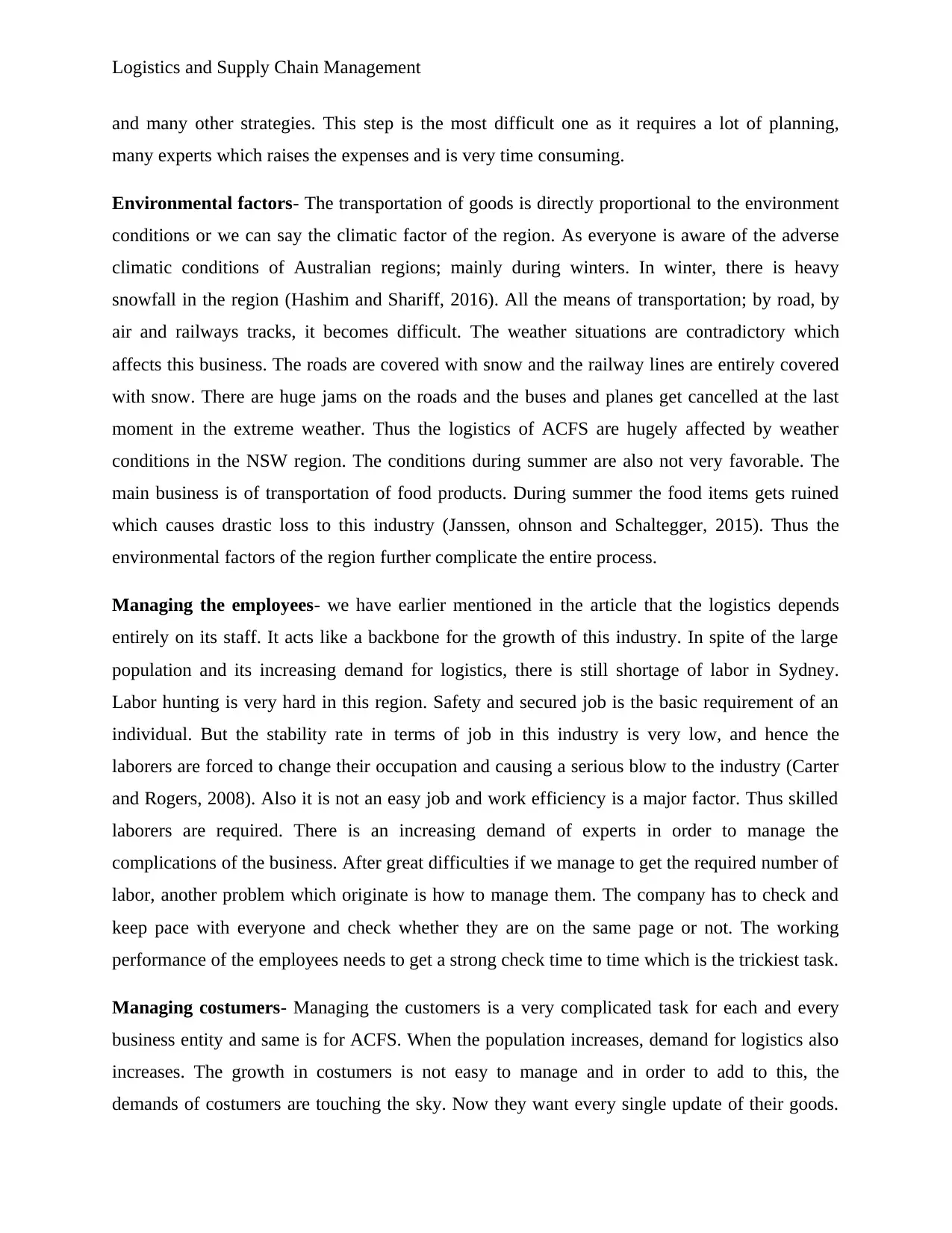
Logistics and Supply Chain Management
and many other strategies. This step is the most difficult one as it requires a lot of planning,
many experts which raises the expenses and is very time consuming.
Environmental factors- The transportation of goods is directly proportional to the environment
conditions or we can say the climatic factor of the region. As everyone is aware of the adverse
climatic conditions of Australian regions; mainly during winters. In winter, there is heavy
snowfall in the region (Hashim and Shariff, 2016). All the means of transportation; by road, by
air and railways tracks, it becomes difficult. The weather situations are contradictory which
affects this business. The roads are covered with snow and the railway lines are entirely covered
with snow. There are huge jams on the roads and the buses and planes get cancelled at the last
moment in the extreme weather. Thus the logistics of ACFS are hugely affected by weather
conditions in the NSW region. The conditions during summer are also not very favorable. The
main business is of transportation of food products. During summer the food items gets ruined
which causes drastic loss to this industry (Janssen, ohnson and Schaltegger, 2015). Thus the
environmental factors of the region further complicate the entire process.
Managing the employees- we have earlier mentioned in the article that the logistics depends
entirely on its staff. It acts like a backbone for the growth of this industry. In spite of the large
population and its increasing demand for logistics, there is still shortage of labor in Sydney.
Labor hunting is very hard in this region. Safety and secured job is the basic requirement of an
individual. But the stability rate in terms of job in this industry is very low, and hence the
laborers are forced to change their occupation and causing a serious blow to the industry (Carter
and Rogers, 2008). Also it is not an easy job and work efficiency is a major factor. Thus skilled
laborers are required. There is an increasing demand of experts in order to manage the
complications of the business. After great difficulties if we manage to get the required number of
labor, another problem which originate is how to manage them. The company has to check and
keep pace with everyone and check whether they are on the same page or not. The working
performance of the employees needs to get a strong check time to time which is the trickiest task.
Managing costumers- Managing the customers is a very complicated task for each and every
business entity and same is for ACFS. When the population increases, demand for logistics also
increases. The growth in costumers is not easy to manage and in order to add to this, the
demands of costumers are touching the sky. Now they want every single update of their goods.
and many other strategies. This step is the most difficult one as it requires a lot of planning,
many experts which raises the expenses and is very time consuming.
Environmental factors- The transportation of goods is directly proportional to the environment
conditions or we can say the climatic factor of the region. As everyone is aware of the adverse
climatic conditions of Australian regions; mainly during winters. In winter, there is heavy
snowfall in the region (Hashim and Shariff, 2016). All the means of transportation; by road, by
air and railways tracks, it becomes difficult. The weather situations are contradictory which
affects this business. The roads are covered with snow and the railway lines are entirely covered
with snow. There are huge jams on the roads and the buses and planes get cancelled at the last
moment in the extreme weather. Thus the logistics of ACFS are hugely affected by weather
conditions in the NSW region. The conditions during summer are also not very favorable. The
main business is of transportation of food products. During summer the food items gets ruined
which causes drastic loss to this industry (Janssen, ohnson and Schaltegger, 2015). Thus the
environmental factors of the region further complicate the entire process.
Managing the employees- we have earlier mentioned in the article that the logistics depends
entirely on its staff. It acts like a backbone for the growth of this industry. In spite of the large
population and its increasing demand for logistics, there is still shortage of labor in Sydney.
Labor hunting is very hard in this region. Safety and secured job is the basic requirement of an
individual. But the stability rate in terms of job in this industry is very low, and hence the
laborers are forced to change their occupation and causing a serious blow to the industry (Carter
and Rogers, 2008). Also it is not an easy job and work efficiency is a major factor. Thus skilled
laborers are required. There is an increasing demand of experts in order to manage the
complications of the business. After great difficulties if we manage to get the required number of
labor, another problem which originate is how to manage them. The company has to check and
keep pace with everyone and check whether they are on the same page or not. The working
performance of the employees needs to get a strong check time to time which is the trickiest task.
Managing costumers- Managing the customers is a very complicated task for each and every
business entity and same is for ACFS. When the population increases, demand for logistics also
increases. The growth in costumers is not easy to manage and in order to add to this, the
demands of costumers are touching the sky. Now they want every single update of their goods.
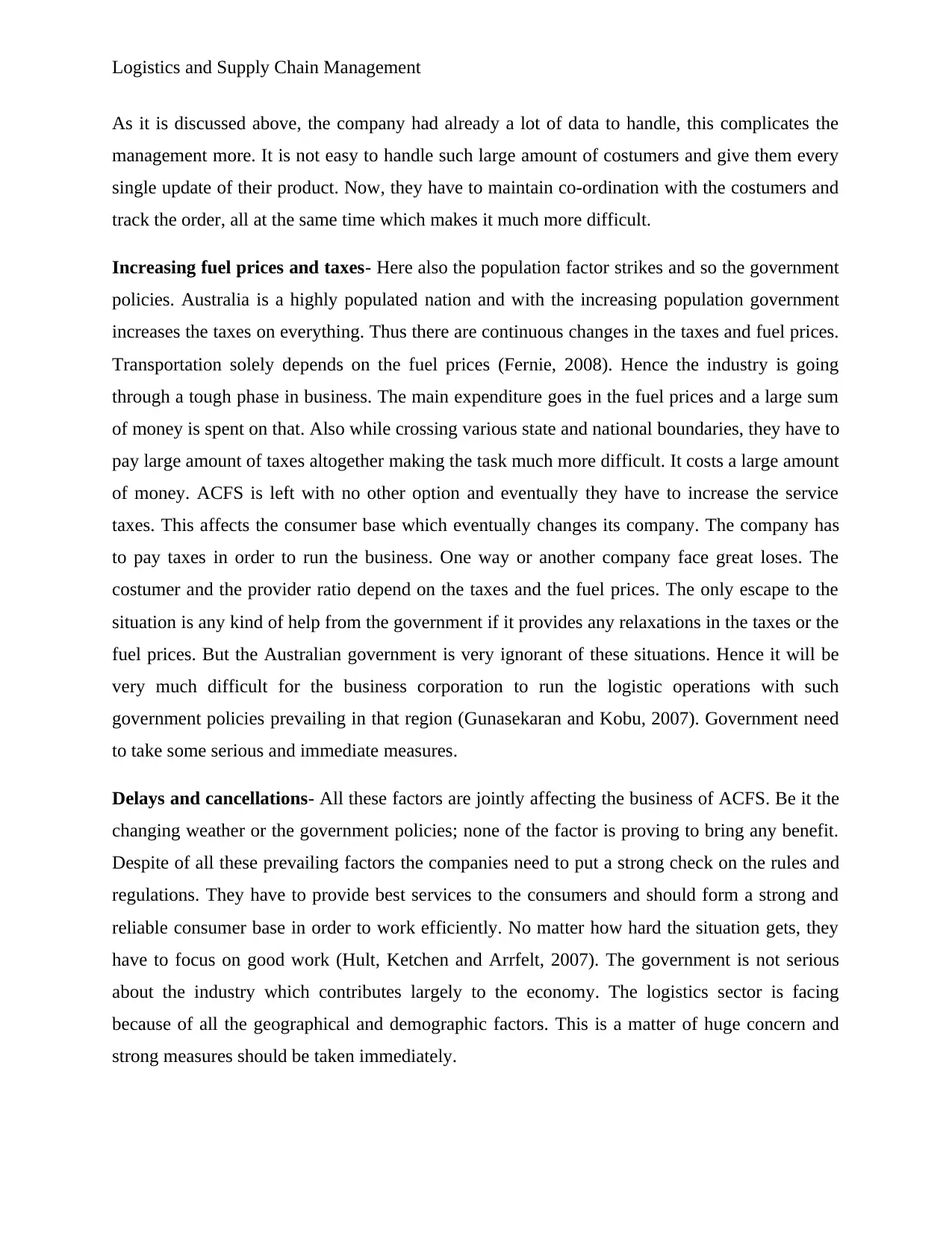
Logistics and Supply Chain Management
As it is discussed above, the company had already a lot of data to handle, this complicates the
management more. It is not easy to handle such large amount of costumers and give them every
single update of their product. Now, they have to maintain co-ordination with the costumers and
track the order, all at the same time which makes it much more difficult.
Increasing fuel prices and taxes- Here also the population factor strikes and so the government
policies. Australia is a highly populated nation and with the increasing population government
increases the taxes on everything. Thus there are continuous changes in the taxes and fuel prices.
Transportation solely depends on the fuel prices (Fernie, 2008). Hence the industry is going
through a tough phase in business. The main expenditure goes in the fuel prices and a large sum
of money is spent on that. Also while crossing various state and national boundaries, they have to
pay large amount of taxes altogether making the task much more difficult. It costs a large amount
of money. ACFS is left with no other option and eventually they have to increase the service
taxes. This affects the consumer base which eventually changes its company. The company has
to pay taxes in order to run the business. One way or another company face great loses. The
costumer and the provider ratio depend on the taxes and the fuel prices. The only escape to the
situation is any kind of help from the government if it provides any relaxations in the taxes or the
fuel prices. But the Australian government is very ignorant of these situations. Hence it will be
very much difficult for the business corporation to run the logistic operations with such
government policies prevailing in that region (Gunasekaran and Kobu, 2007). Government need
to take some serious and immediate measures.
Delays and cancellations- All these factors are jointly affecting the business of ACFS. Be it the
changing weather or the government policies; none of the factor is proving to bring any benefit.
Despite of all these prevailing factors the companies need to put a strong check on the rules and
regulations. They have to provide best services to the consumers and should form a strong and
reliable consumer base in order to work efficiently. No matter how hard the situation gets, they
have to focus on good work (Hult, Ketchen and Arrfelt, 2007). The government is not serious
about the industry which contributes largely to the economy. The logistics sector is facing
because of all the geographical and demographic factors. This is a matter of huge concern and
strong measures should be taken immediately.
As it is discussed above, the company had already a lot of data to handle, this complicates the
management more. It is not easy to handle such large amount of costumers and give them every
single update of their product. Now, they have to maintain co-ordination with the costumers and
track the order, all at the same time which makes it much more difficult.
Increasing fuel prices and taxes- Here also the population factor strikes and so the government
policies. Australia is a highly populated nation and with the increasing population government
increases the taxes on everything. Thus there are continuous changes in the taxes and fuel prices.
Transportation solely depends on the fuel prices (Fernie, 2008). Hence the industry is going
through a tough phase in business. The main expenditure goes in the fuel prices and a large sum
of money is spent on that. Also while crossing various state and national boundaries, they have to
pay large amount of taxes altogether making the task much more difficult. It costs a large amount
of money. ACFS is left with no other option and eventually they have to increase the service
taxes. This affects the consumer base which eventually changes its company. The company has
to pay taxes in order to run the business. One way or another company face great loses. The
costumer and the provider ratio depend on the taxes and the fuel prices. The only escape to the
situation is any kind of help from the government if it provides any relaxations in the taxes or the
fuel prices. But the Australian government is very ignorant of these situations. Hence it will be
very much difficult for the business corporation to run the logistic operations with such
government policies prevailing in that region (Gunasekaran and Kobu, 2007). Government need
to take some serious and immediate measures.
Delays and cancellations- All these factors are jointly affecting the business of ACFS. Be it the
changing weather or the government policies; none of the factor is proving to bring any benefit.
Despite of all these prevailing factors the companies need to put a strong check on the rules and
regulations. They have to provide best services to the consumers and should form a strong and
reliable consumer base in order to work efficiently. No matter how hard the situation gets, they
have to focus on good work (Hult, Ketchen and Arrfelt, 2007). The government is not serious
about the industry which contributes largely to the economy. The logistics sector is facing
because of all the geographical and demographic factors. This is a matter of huge concern and
strong measures should be taken immediately.
⊘ This is a preview!⊘
Do you want full access?
Subscribe today to unlock all pages.

Trusted by 1+ million students worldwide
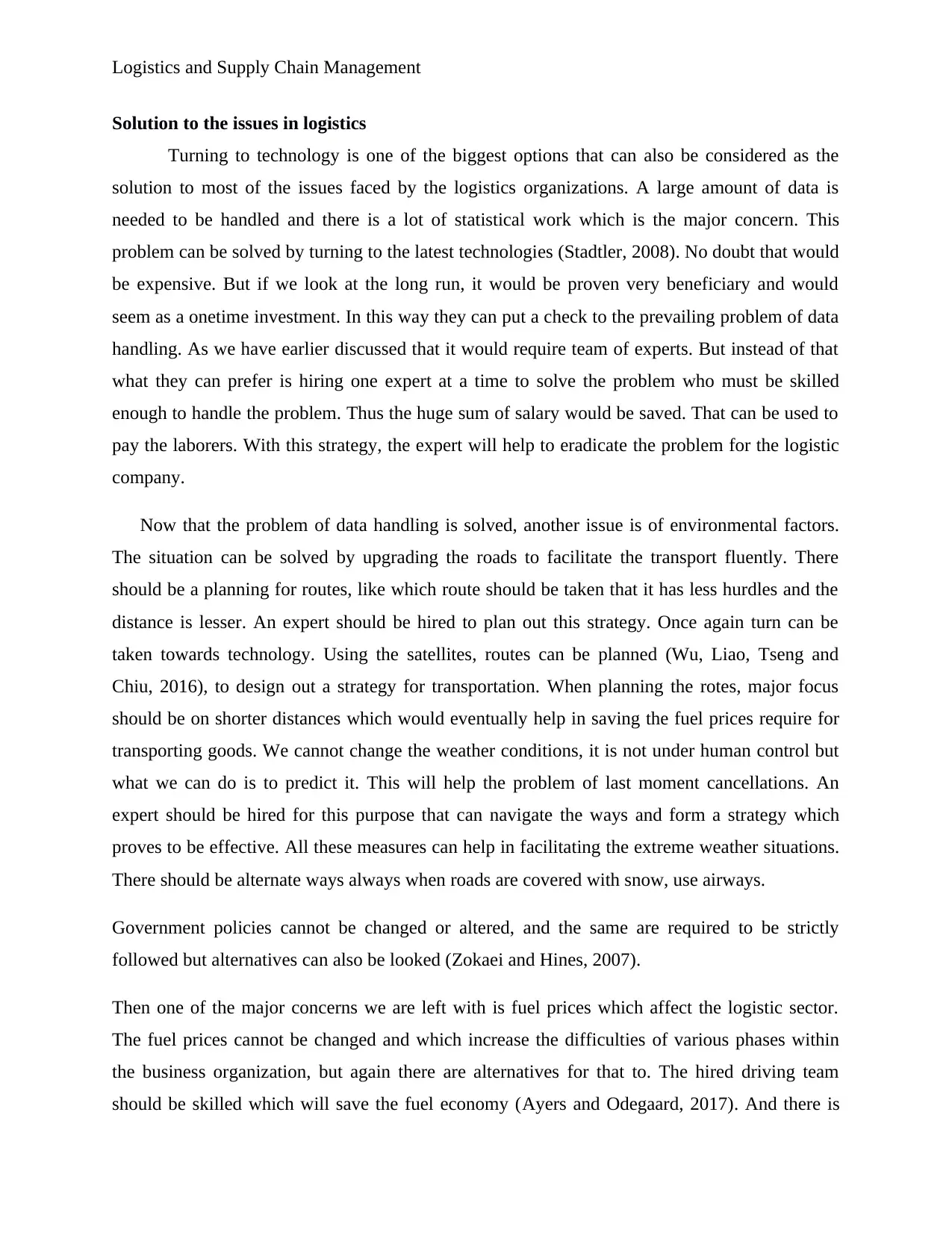
Logistics and Supply Chain Management
Solution to the issues in logistics
Turning to technology is one of the biggest options that can also be considered as the
solution to most of the issues faced by the logistics organizations. A large amount of data is
needed to be handled and there is a lot of statistical work which is the major concern. This
problem can be solved by turning to the latest technologies (Stadtler, 2008). No doubt that would
be expensive. But if we look at the long run, it would be proven very beneficiary and would
seem as a onetime investment. In this way they can put a check to the prevailing problem of data
handling. As we have earlier discussed that it would require team of experts. But instead of that
what they can prefer is hiring one expert at a time to solve the problem who must be skilled
enough to handle the problem. Thus the huge sum of salary would be saved. That can be used to
pay the laborers. With this strategy, the expert will help to eradicate the problem for the logistic
company.
Now that the problem of data handling is solved, another issue is of environmental factors.
The situation can be solved by upgrading the roads to facilitate the transport fluently. There
should be a planning for routes, like which route should be taken that it has less hurdles and the
distance is lesser. An expert should be hired to plan out this strategy. Once again turn can be
taken towards technology. Using the satellites, routes can be planned (Wu, Liao, Tseng and
Chiu, 2016), to design out a strategy for transportation. When planning the rotes, major focus
should be on shorter distances which would eventually help in saving the fuel prices require for
transporting goods. We cannot change the weather conditions, it is not under human control but
what we can do is to predict it. This will help the problem of last moment cancellations. An
expert should be hired for this purpose that can navigate the ways and form a strategy which
proves to be effective. All these measures can help in facilitating the extreme weather situations.
There should be alternate ways always when roads are covered with snow, use airways.
Government policies cannot be changed or altered, and the same are required to be strictly
followed but alternatives can also be looked (Zokaei and Hines, 2007).
Then one of the major concerns we are left with is fuel prices which affect the logistic sector.
The fuel prices cannot be changed and which increase the difficulties of various phases within
the business organization, but again there are alternatives for that to. The hired driving team
should be skilled which will save the fuel economy (Ayers and Odegaard, 2017). And there is
Solution to the issues in logistics
Turning to technology is one of the biggest options that can also be considered as the
solution to most of the issues faced by the logistics organizations. A large amount of data is
needed to be handled and there is a lot of statistical work which is the major concern. This
problem can be solved by turning to the latest technologies (Stadtler, 2008). No doubt that would
be expensive. But if we look at the long run, it would be proven very beneficiary and would
seem as a onetime investment. In this way they can put a check to the prevailing problem of data
handling. As we have earlier discussed that it would require team of experts. But instead of that
what they can prefer is hiring one expert at a time to solve the problem who must be skilled
enough to handle the problem. Thus the huge sum of salary would be saved. That can be used to
pay the laborers. With this strategy, the expert will help to eradicate the problem for the logistic
company.
Now that the problem of data handling is solved, another issue is of environmental factors.
The situation can be solved by upgrading the roads to facilitate the transport fluently. There
should be a planning for routes, like which route should be taken that it has less hurdles and the
distance is lesser. An expert should be hired to plan out this strategy. Once again turn can be
taken towards technology. Using the satellites, routes can be planned (Wu, Liao, Tseng and
Chiu, 2016), to design out a strategy for transportation. When planning the rotes, major focus
should be on shorter distances which would eventually help in saving the fuel prices require for
transporting goods. We cannot change the weather conditions, it is not under human control but
what we can do is to predict it. This will help the problem of last moment cancellations. An
expert should be hired for this purpose that can navigate the ways and form a strategy which
proves to be effective. All these measures can help in facilitating the extreme weather situations.
There should be alternate ways always when roads are covered with snow, use airways.
Government policies cannot be changed or altered, and the same are required to be strictly
followed but alternatives can also be looked (Zokaei and Hines, 2007).
Then one of the major concerns we are left with is fuel prices which affect the logistic sector.
The fuel prices cannot be changed and which increase the difficulties of various phases within
the business organization, but again there are alternatives for that to. The hired driving team
should be skilled which will save the fuel economy (Ayers and Odegaard, 2017). And there is
Paraphrase This Document
Need a fresh take? Get an instant paraphrase of this document with our AI Paraphraser
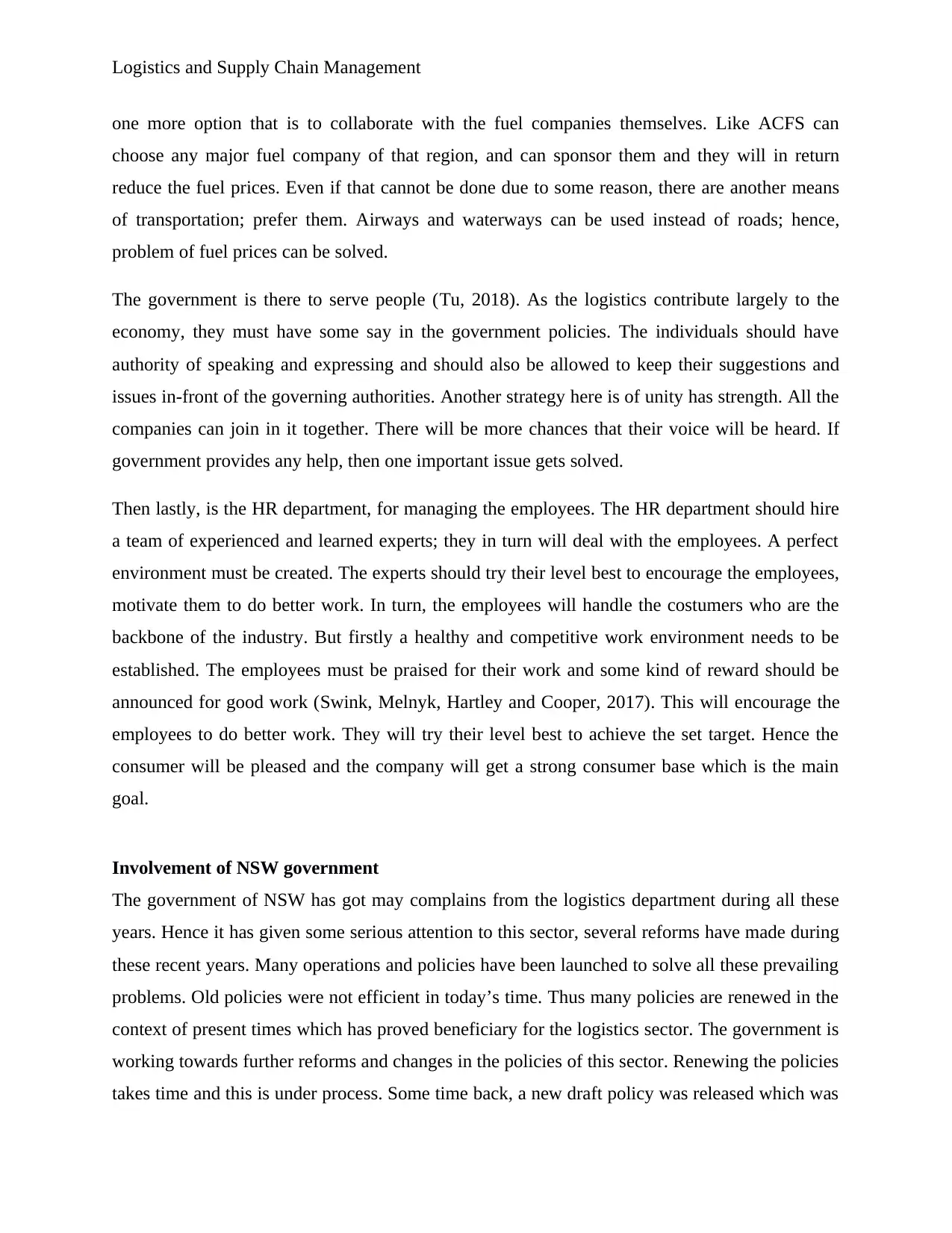
Logistics and Supply Chain Management
one more option that is to collaborate with the fuel companies themselves. Like ACFS can
choose any major fuel company of that region, and can sponsor them and they will in return
reduce the fuel prices. Even if that cannot be done due to some reason, there are another means
of transportation; prefer them. Airways and waterways can be used instead of roads; hence,
problem of fuel prices can be solved.
The government is there to serve people (Tu, 2018). As the logistics contribute largely to the
economy, they must have some say in the government policies. The individuals should have
authority of speaking and expressing and should also be allowed to keep their suggestions and
issues in-front of the governing authorities. Another strategy here is of unity has strength. All the
companies can join in it together. There will be more chances that their voice will be heard. If
government provides any help, then one important issue gets solved.
Then lastly, is the HR department, for managing the employees. The HR department should hire
a team of experienced and learned experts; they in turn will deal with the employees. A perfect
environment must be created. The experts should try their level best to encourage the employees,
motivate them to do better work. In turn, the employees will handle the costumers who are the
backbone of the industry. But firstly a healthy and competitive work environment needs to be
established. The employees must be praised for their work and some kind of reward should be
announced for good work (Swink, Melnyk, Hartley and Cooper, 2017). This will encourage the
employees to do better work. They will try their level best to achieve the set target. Hence the
consumer will be pleased and the company will get a strong consumer base which is the main
goal.
Involvement of NSW government
The government of NSW has got may complains from the logistics department during all these
years. Hence it has given some serious attention to this sector, several reforms have made during
these recent years. Many operations and policies have been launched to solve all these prevailing
problems. Old policies were not efficient in today’s time. Thus many policies are renewed in the
context of present times which has proved beneficiary for the logistics sector. The government is
working towards further reforms and changes in the policies of this sector. Renewing the policies
takes time and this is under process. Some time back, a new draft policy was released which was
one more option that is to collaborate with the fuel companies themselves. Like ACFS can
choose any major fuel company of that region, and can sponsor them and they will in return
reduce the fuel prices. Even if that cannot be done due to some reason, there are another means
of transportation; prefer them. Airways and waterways can be used instead of roads; hence,
problem of fuel prices can be solved.
The government is there to serve people (Tu, 2018). As the logistics contribute largely to the
economy, they must have some say in the government policies. The individuals should have
authority of speaking and expressing and should also be allowed to keep their suggestions and
issues in-front of the governing authorities. Another strategy here is of unity has strength. All the
companies can join in it together. There will be more chances that their voice will be heard. If
government provides any help, then one important issue gets solved.
Then lastly, is the HR department, for managing the employees. The HR department should hire
a team of experienced and learned experts; they in turn will deal with the employees. A perfect
environment must be created. The experts should try their level best to encourage the employees,
motivate them to do better work. In turn, the employees will handle the costumers who are the
backbone of the industry. But firstly a healthy and competitive work environment needs to be
established. The employees must be praised for their work and some kind of reward should be
announced for good work (Swink, Melnyk, Hartley and Cooper, 2017). This will encourage the
employees to do better work. They will try their level best to achieve the set target. Hence the
consumer will be pleased and the company will get a strong consumer base which is the main
goal.
Involvement of NSW government
The government of NSW has got may complains from the logistics department during all these
years. Hence it has given some serious attention to this sector, several reforms have made during
these recent years. Many operations and policies have been launched to solve all these prevailing
problems. Old policies were not efficient in today’s time. Thus many policies are renewed in the
context of present times which has proved beneficiary for the logistics sector. The government is
working towards further reforms and changes in the policies of this sector. Renewing the policies
takes time and this is under process. Some time back, a new draft policy was released which was
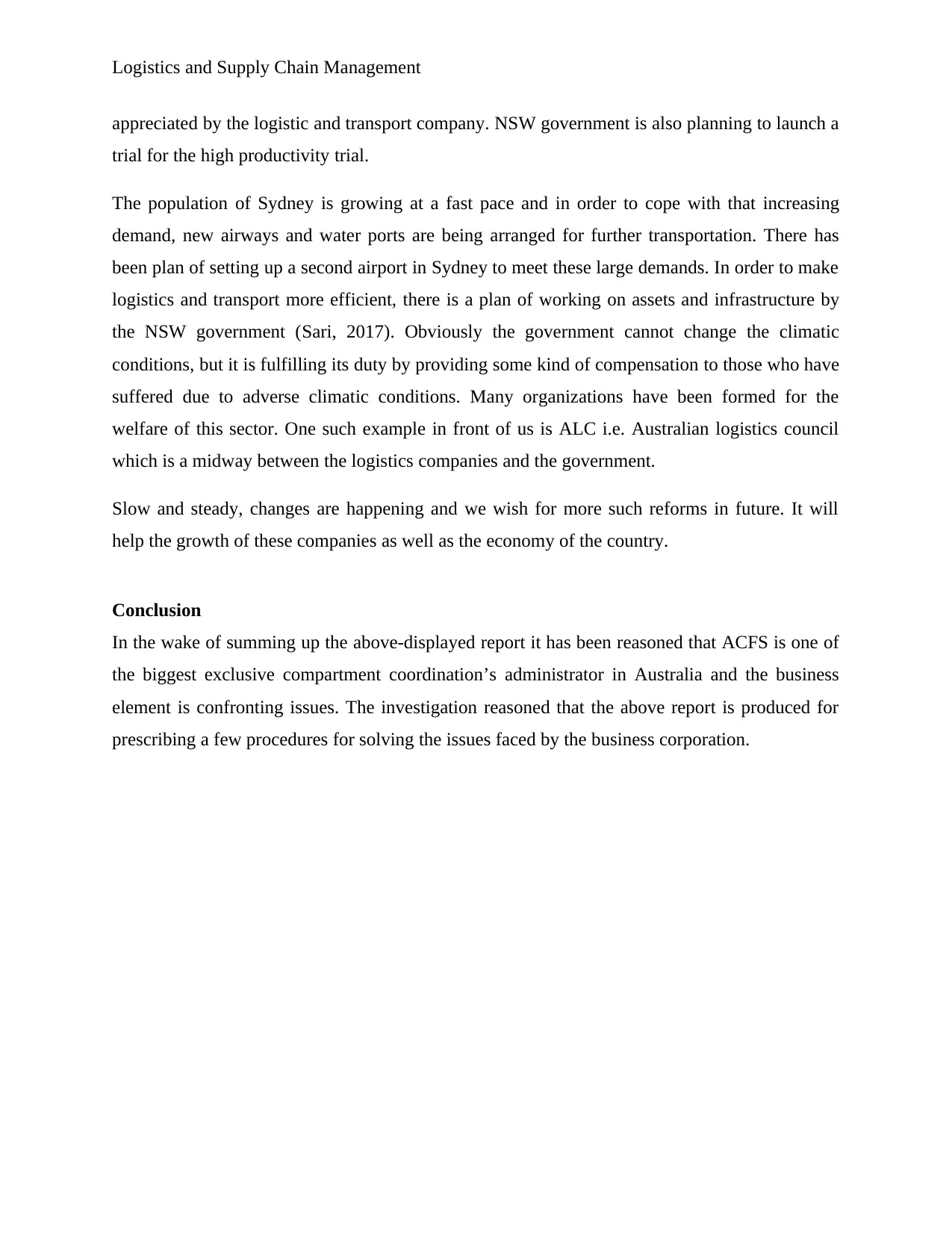
Logistics and Supply Chain Management
appreciated by the logistic and transport company. NSW government is also planning to launch a
trial for the high productivity trial.
The population of Sydney is growing at a fast pace and in order to cope with that increasing
demand, new airways and water ports are being arranged for further transportation. There has
been plan of setting up a second airport in Sydney to meet these large demands. In order to make
logistics and transport more efficient, there is a plan of working on assets and infrastructure by
the NSW government (Sari, 2017). Obviously the government cannot change the climatic
conditions, but it is fulfilling its duty by providing some kind of compensation to those who have
suffered due to adverse climatic conditions. Many organizations have been formed for the
welfare of this sector. One such example in front of us is ALC i.e. Australian logistics council
which is a midway between the logistics companies and the government.
Slow and steady, changes are happening and we wish for more such reforms in future. It will
help the growth of these companies as well as the economy of the country.
Conclusion
In the wake of summing up the above-displayed report it has been reasoned that ACFS is one of
the biggest exclusive compartment coordination’s administrator in Australia and the business
element is confronting issues. The investigation reasoned that the above report is produced for
prescribing a few procedures for solving the issues faced by the business corporation.
appreciated by the logistic and transport company. NSW government is also planning to launch a
trial for the high productivity trial.
The population of Sydney is growing at a fast pace and in order to cope with that increasing
demand, new airways and water ports are being arranged for further transportation. There has
been plan of setting up a second airport in Sydney to meet these large demands. In order to make
logistics and transport more efficient, there is a plan of working on assets and infrastructure by
the NSW government (Sari, 2017). Obviously the government cannot change the climatic
conditions, but it is fulfilling its duty by providing some kind of compensation to those who have
suffered due to adverse climatic conditions. Many organizations have been formed for the
welfare of this sector. One such example in front of us is ALC i.e. Australian logistics council
which is a midway between the logistics companies and the government.
Slow and steady, changes are happening and we wish for more such reforms in future. It will
help the growth of these companies as well as the economy of the country.
Conclusion
In the wake of summing up the above-displayed report it has been reasoned that ACFS is one of
the biggest exclusive compartment coordination’s administrator in Australia and the business
element is confronting issues. The investigation reasoned that the above report is produced for
prescribing a few procedures for solving the issues faced by the business corporation.
⊘ This is a preview!⊘
Do you want full access?
Subscribe today to unlock all pages.

Trusted by 1+ million students worldwide
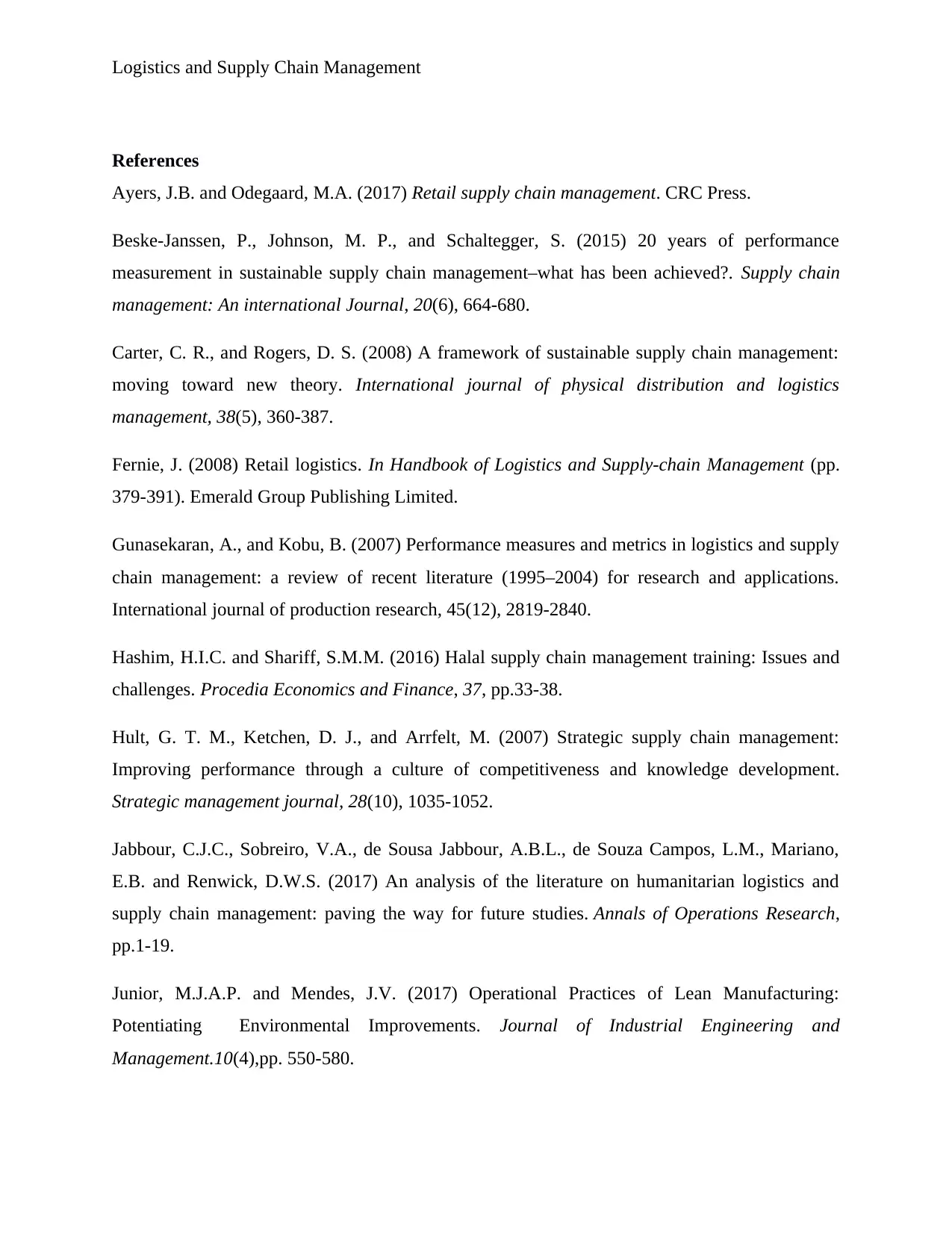
Logistics and Supply Chain Management
References
Ayers, J.B. and Odegaard, M.A. (2017) Retail supply chain management. CRC Press.
Beske-Janssen, P., Johnson, M. P., and Schaltegger, S. (2015) 20 years of performance
measurement in sustainable supply chain management–what has been achieved?. Supply chain
management: An international Journal, 20(6), 664-680.
Carter, C. R., and Rogers, D. S. (2008) A framework of sustainable supply chain management:
moving toward new theory. International journal of physical distribution and logistics
management, 38(5), 360-387.
Fernie, J. (2008) Retail logistics. In Handbook of Logistics and Supply-chain Management (pp.
379-391). Emerald Group Publishing Limited.
Gunasekaran, A., and Kobu, B. (2007) Performance measures and metrics in logistics and supply
chain management: a review of recent literature (1995–2004) for research and applications.
International journal of production research, 45(12), 2819-2840.
Hashim, H.I.C. and Shariff, S.M.M. (2016) Halal supply chain management training: Issues and
challenges. Procedia Economics and Finance, 37, pp.33-38.
Hult, G. T. M., Ketchen, D. J., and Arrfelt, M. (2007) Strategic supply chain management:
Improving performance through a culture of competitiveness and knowledge development.
Strategic management journal, 28(10), 1035-1052.
Jabbour, C.J.C., Sobreiro, V.A., de Sousa Jabbour, A.B.L., de Souza Campos, L.M., Mariano,
E.B. and Renwick, D.W.S. (2017) An analysis of the literature on humanitarian logistics and
supply chain management: paving the way for future studies. Annals of Operations Research,
pp.1-19.
Junior, M.J.A.P. and Mendes, J.V. (2017) Operational Practices of Lean Manufacturing:
Potentiating Environmental Improvements. Journal of Industrial Engineering and
Management.10(4),pp. 550-580.
References
Ayers, J.B. and Odegaard, M.A. (2017) Retail supply chain management. CRC Press.
Beske-Janssen, P., Johnson, M. P., and Schaltegger, S. (2015) 20 years of performance
measurement in sustainable supply chain management–what has been achieved?. Supply chain
management: An international Journal, 20(6), 664-680.
Carter, C. R., and Rogers, D. S. (2008) A framework of sustainable supply chain management:
moving toward new theory. International journal of physical distribution and logistics
management, 38(5), 360-387.
Fernie, J. (2008) Retail logistics. In Handbook of Logistics and Supply-chain Management (pp.
379-391). Emerald Group Publishing Limited.
Gunasekaran, A., and Kobu, B. (2007) Performance measures and metrics in logistics and supply
chain management: a review of recent literature (1995–2004) for research and applications.
International journal of production research, 45(12), 2819-2840.
Hashim, H.I.C. and Shariff, S.M.M. (2016) Halal supply chain management training: Issues and
challenges. Procedia Economics and Finance, 37, pp.33-38.
Hult, G. T. M., Ketchen, D. J., and Arrfelt, M. (2007) Strategic supply chain management:
Improving performance through a culture of competitiveness and knowledge development.
Strategic management journal, 28(10), 1035-1052.
Jabbour, C.J.C., Sobreiro, V.A., de Sousa Jabbour, A.B.L., de Souza Campos, L.M., Mariano,
E.B. and Renwick, D.W.S. (2017) An analysis of the literature on humanitarian logistics and
supply chain management: paving the way for future studies. Annals of Operations Research,
pp.1-19.
Junior, M.J.A.P. and Mendes, J.V. (2017) Operational Practices of Lean Manufacturing:
Potentiating Environmental Improvements. Journal of Industrial Engineering and
Management.10(4),pp. 550-580.
Paraphrase This Document
Need a fresh take? Get an instant paraphrase of this document with our AI Paraphraser
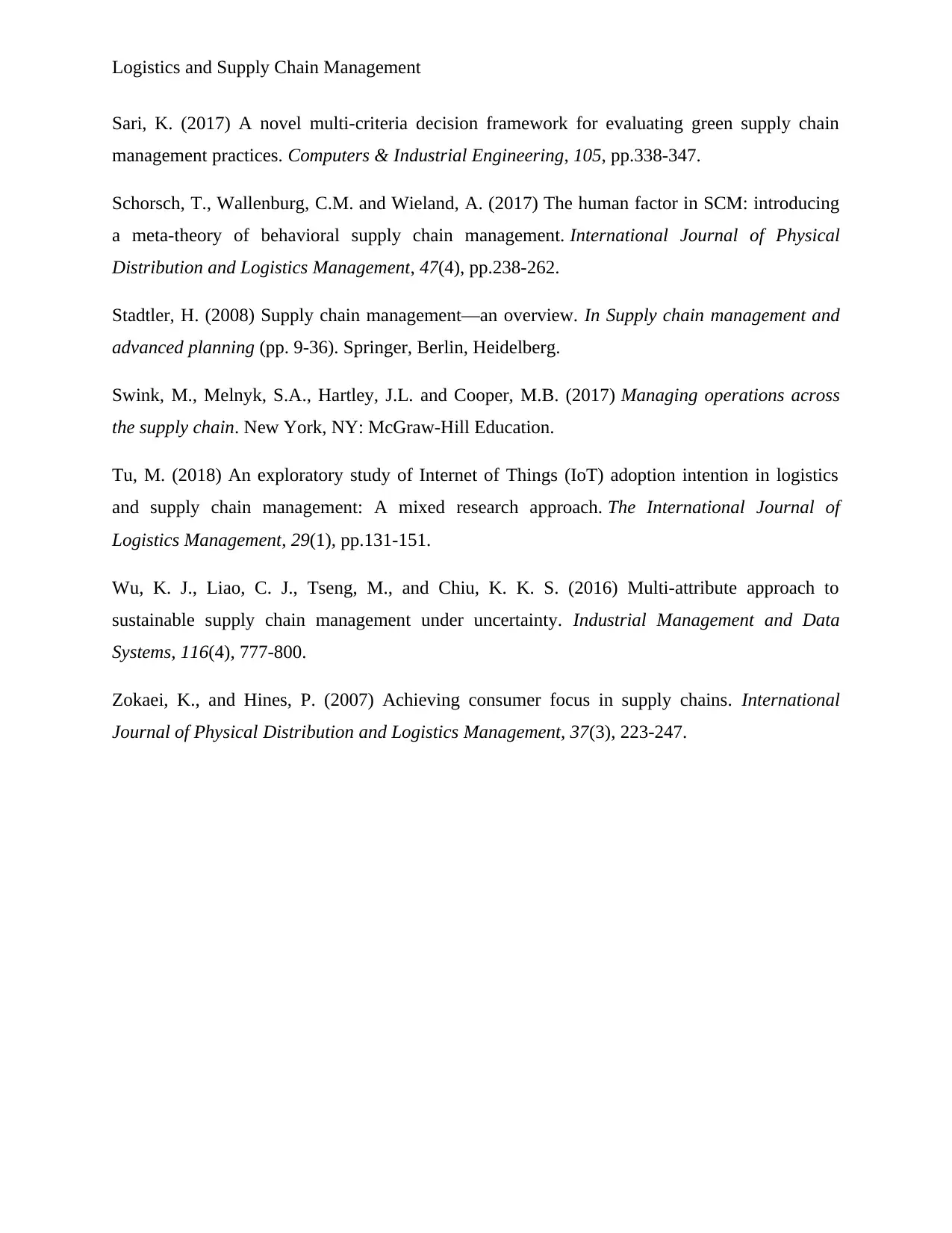
Logistics and Supply Chain Management
Sari, K. (2017) A novel multi-criteria decision framework for evaluating green supply chain
management practices. Computers & Industrial Engineering, 105, pp.338-347.
Schorsch, T., Wallenburg, C.M. and Wieland, A. (2017) The human factor in SCM: introducing
a meta-theory of behavioral supply chain management. International Journal of Physical
Distribution and Logistics Management, 47(4), pp.238-262.
Stadtler, H. (2008) Supply chain management—an overview. In Supply chain management and
advanced planning (pp. 9-36). Springer, Berlin, Heidelberg.
Swink, M., Melnyk, S.A., Hartley, J.L. and Cooper, M.B. (2017) Managing operations across
the supply chain. New York, NY: McGraw-Hill Education.
Tu, M. (2018) An exploratory study of Internet of Things (IoT) adoption intention in logistics
and supply chain management: A mixed research approach. The International Journal of
Logistics Management, 29(1), pp.131-151.
Wu, K. J., Liao, C. J., Tseng, M., and Chiu, K. K. S. (2016) Multi-attribute approach to
sustainable supply chain management under uncertainty. Industrial Management and Data
Systems, 116(4), 777-800.
Zokaei, K., and Hines, P. (2007) Achieving consumer focus in supply chains. International
Journal of Physical Distribution and Logistics Management, 37(3), 223-247.
Sari, K. (2017) A novel multi-criteria decision framework for evaluating green supply chain
management practices. Computers & Industrial Engineering, 105, pp.338-347.
Schorsch, T., Wallenburg, C.M. and Wieland, A. (2017) The human factor in SCM: introducing
a meta-theory of behavioral supply chain management. International Journal of Physical
Distribution and Logistics Management, 47(4), pp.238-262.
Stadtler, H. (2008) Supply chain management—an overview. In Supply chain management and
advanced planning (pp. 9-36). Springer, Berlin, Heidelberg.
Swink, M., Melnyk, S.A., Hartley, J.L. and Cooper, M.B. (2017) Managing operations across
the supply chain. New York, NY: McGraw-Hill Education.
Tu, M. (2018) An exploratory study of Internet of Things (IoT) adoption intention in logistics
and supply chain management: A mixed research approach. The International Journal of
Logistics Management, 29(1), pp.131-151.
Wu, K. J., Liao, C. J., Tseng, M., and Chiu, K. K. S. (2016) Multi-attribute approach to
sustainable supply chain management under uncertainty. Industrial Management and Data
Systems, 116(4), 777-800.
Zokaei, K., and Hines, P. (2007) Achieving consumer focus in supply chains. International
Journal of Physical Distribution and Logistics Management, 37(3), 223-247.
1 out of 11
Related Documents
Your All-in-One AI-Powered Toolkit for Academic Success.
+13062052269
info@desklib.com
Available 24*7 on WhatsApp / Email
![[object Object]](/_next/static/media/star-bottom.7253800d.svg)
Unlock your academic potential
Copyright © 2020–2026 A2Z Services. All Rights Reserved. Developed and managed by ZUCOL.





